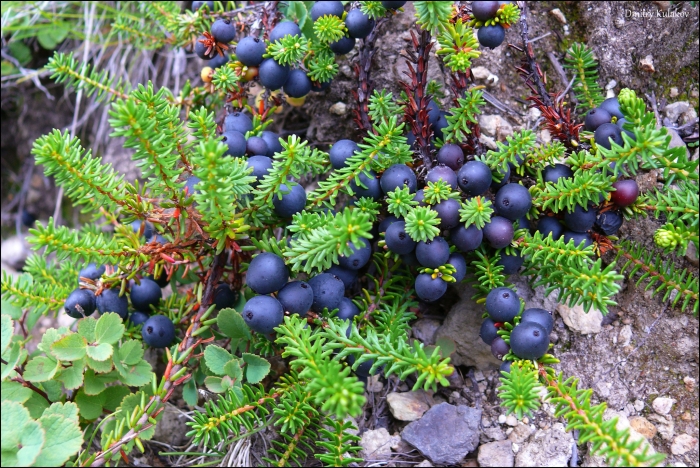Crowberry
(Empetrum nigrum)
Crowberry (Empetrum nigrum)
/
/

Dmitry Kulakov
CC BY 4.0
Image By:
Dmitry Kulakov
Recorded By:
Copyright:
CC BY 4.0
Copyright Notice:
Photo by: Dmitry Kulakov | License Type: CC BY 4.0 | License URL: http://creativecommons.org/licenses/by/4.0/ | Rights Holder: Dmitry Kulakov | Publisher: iNaturalist | Date Created: 2011-08-05T12:27:22-07:00 |

























Estimated Native Range
Summary
Empetrum nigrum, commonly known as crowberry or black crowberry, is an evergreen shrub native to a variety of habitats including tundra, moorlands, and boreal forests across the circumboreal region of the Northern Hemisphere, as well as the Falkland Islands. It typically forms dense mats and grows to a height of 4-6 inches (10-15 cm) with a creeping habit. The leaves are small, needle-like, and dark green, contributing to its year-round interest. Crowberry produces small, bell-shaped greenish-pink flowers from May to June, which are not particularly showy but are followed by notable black or purplish-black drupes. The fruit is edible, though acidic, and is harvested for use in liqueurs, wines, juices, and jellies.
Crowberry is valued for its ability to thrive in acidic, moist, but well-drained soils and shady conditions, making it an excellent choice for ground cover in challenging garden spots. It is also used in rock gardens for its texture and winter interest. The plant’s evergreen foliage and tolerance of cold climates make it a reliable year-round performer. While it is not prone to many diseases, it can suffer from root rot in poorly drained soils. Crowberry is also important ecologically, serving as a food source for various animals and playing a significant role in the diets of indigenous peoples such as the Inuit and Sami.CC BY-SA 4.0
Crowberry is valued for its ability to thrive in acidic, moist, but well-drained soils and shady conditions, making it an excellent choice for ground cover in challenging garden spots. It is also used in rock gardens for its texture and winter interest. The plant’s evergreen foliage and tolerance of cold climates make it a reliable year-round performer. While it is not prone to many diseases, it can suffer from root rot in poorly drained soils. Crowberry is also important ecologically, serving as a food source for various animals and playing a significant role in the diets of indigenous peoples such as the Inuit and Sami.CC BY-SA 4.0
Plant Description
- Plant Type: Shrub
- Height: 0.3-0.5 feet
- Width: 1-2 feet
- Growth Rate: Slow
- Flower Color: Pink, Purple
- Flowering Season: Spring, Summer
- Leaf Retention: Evergreen
Growth Requirements
- Sun: Full Sun, Part Shade
- Water: Medium
- Drainage: Medium, Slow
Common Uses
Edible*Disclaimer: Easyscape's listed plant edibility is for informational use. Always verify the safety and proper identification of any plant before consumption., Groundcover, Low Maintenance
Natural Habitat
Tundra, moorlands, and boreal forests across the circumboreal region of the Northern Hemisphere, as well as the Falkland Islands
Other Names
Common Names: Curlewberry, Crakeberry, Crowberry
Scientific Names: , Empetrum nigrum, Empetrum eamesii subsp. eamesii, Empetrum nigrum f. nigrum, Empetrum nigrum var. asiaticum, Empetrum nigrum var. nigrum, Empetrum subholarcticum var. baicalense, Empetrum subholarcticum var. glabrum, Empetrum subholarcticum var. sachalinense,
GBIF Accepted Name: